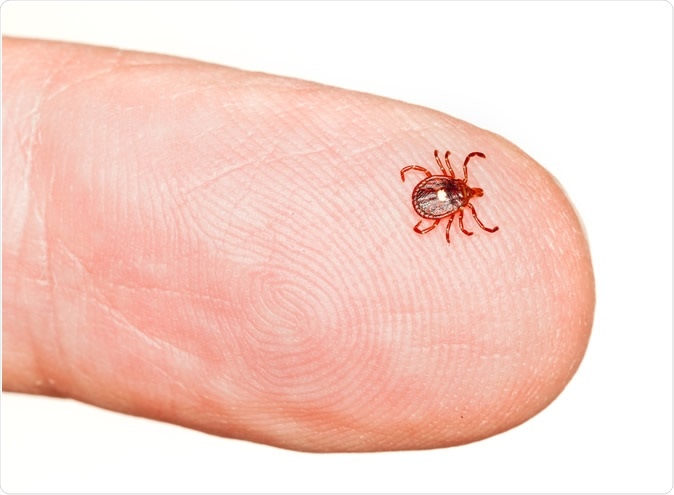Researchers from University of Virginia School of Medicine have uncovered the mystery behind development of allergic reactions to red meat such as beef in some individuals. Recently there has been a body of research on allergies to meat developing in individuals due to tick bites.
The study titled, “Cutaneous Exposure to Clinically Relevant Lone Star Ticks Promotes IgE Production and Hypersensitivity through CD4+ T Cell– and MyD88-Dependent Pathways in Mice,” was published in the latest issue of The Journal of Immunology.

Close up of lone star or seed tick. Image Credit: Steve Heap / Shutterstock
Work by Loren Erickson, from Department of Microbiology, Immunology and Cancer Biology, and his team shows the immunological changes that are noted when a person suddenly develops life threatening allergies to meat. The team explains that some people who have been enjoying meat all their lives may develop an allergy to it and the manifestations could range from mild nausea and vomiting to hives to life threatening anaphylactic reactions.

The new discovery by UVA's Loren Erickson, PhD, is an important step toward understanding the strange meat allergy spread by ticks -- and developing a treatment for it. Image Credit: UVA Health
Erickson, also a member of a member of UVA's Carter Immunology Center, said in a statement explaining, “We don't know what it is about the tick bite that causes the meat allergy. And, in particular, we haven't really understood the source of immune cells that produce the antibodies that cause the allergic reactions. There's no way to prevent or cure this food allergy, so we need to first understand the underlying mechanism that triggers the allergy so we can devise a new therapy.”
The authors of the study wrote, “Tick-borne allergies are a growing public health concern and have been associated with the induction of IgE-mediated food allergy to red meat.” The connection between the meat allergy and the tick bite was first made by Thomas Platts-Mills, an allergy specialist from UVA. He had explained that mammalian meat contained a sugar called the alpha-gal and this tick bite was causing an allergic reaction of these individuals to this sugar. The exact immunological workings of the allergy have not been known said Erickson and this new study strives to uncover that.
The team writes that the persons who have developed allergies to mammalian meat show a distinctive immune cell in their body in large numbers. These B cells are white blood cells that can produce antibodies and thus release chemicals leading to allergic reactions to mammalian meat. To understand this, the team used lab mice models of allergy and studied the immunological reactions. They noted that lone star tick bites could trigger the release of antibodies called IgE and this leads to the hypersensitivity or allergic reactions in the mice. The immunological reactions trigger the use and recruitment of specialized immune markers called the CD4+ T cell. Both together determine the hypersensitivity reactions of the body to mammalian meat and its components, wrote the researchers.
In the lab mice models of allergy, the allergy was triggered by administering tick proteins as injections through the skin surfaces of the mice. This led to the release of antibodies IgE in the body. The IgE and the CD4+ T were found to be working in collaboration to raise the hypersensitivity reactions to orally administered red meat to the mice, the team noted. They found that the B cells of the immune system expressed a protein called the MyD88. This led to a cascade of signals called the “TLR signalling” into the B cells. When signalled in this manner the IgE responses to the tick proteins was triggered wrote the researchers. The researchers explained that they developed this mouse model for further study of tick bite induced allergic reactions to red meat. They wrote in conclusion, “This model of tick-induced IgE responses could be used to study the factors within tick bites that cause allergies and to investigate how sensitization to food Ags (food allergens or Antigens) occurs through the skin that leads to IgE production.”
Erickson said, “This is the first clinically relevant model that I know of, so now we can go and ask a lot of these important questions. We can actually use this model to identify underlying causes of the meat allergy that may inform human studies. So it's sort of a back-and-forth of experiments that you can do in animal models that you can't do in humans. But you can identify potential mechanisms that could lead to new therapeutic strategies so that we can go back to human subjects and test some of those hypotheses.”
This study was supported and funded by a grant from the National Institutes of Health (NIH).
Journal reference:
Cutaneous Exposure to Clinically Relevant Lone Star Ticks Promotes IgE Production and Hypersensitivity through CD4+ T Cell– and MyD88-Dependent Pathways in Mice
Jessica L. Chandrasekhar, Kelly M. Cox, William M. Loo, Hui Qiao, Kenneth S. Tung and Loren D. Erickson, J Immunol August 15, 2019, 203 (4) 813-824; DOI: https://www.jimmunol.org/content/203/4/813